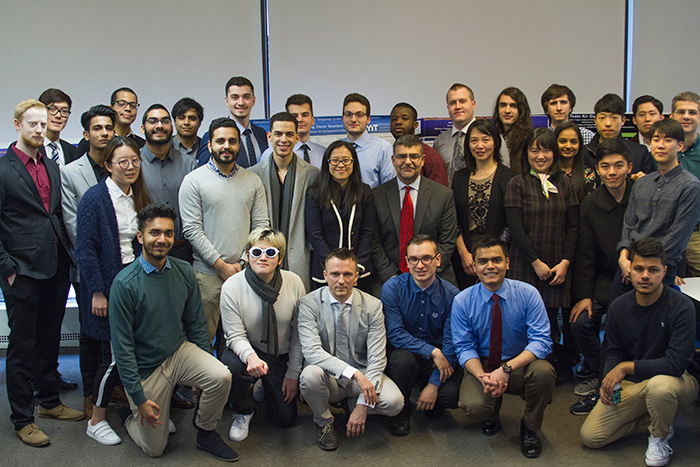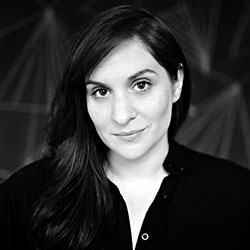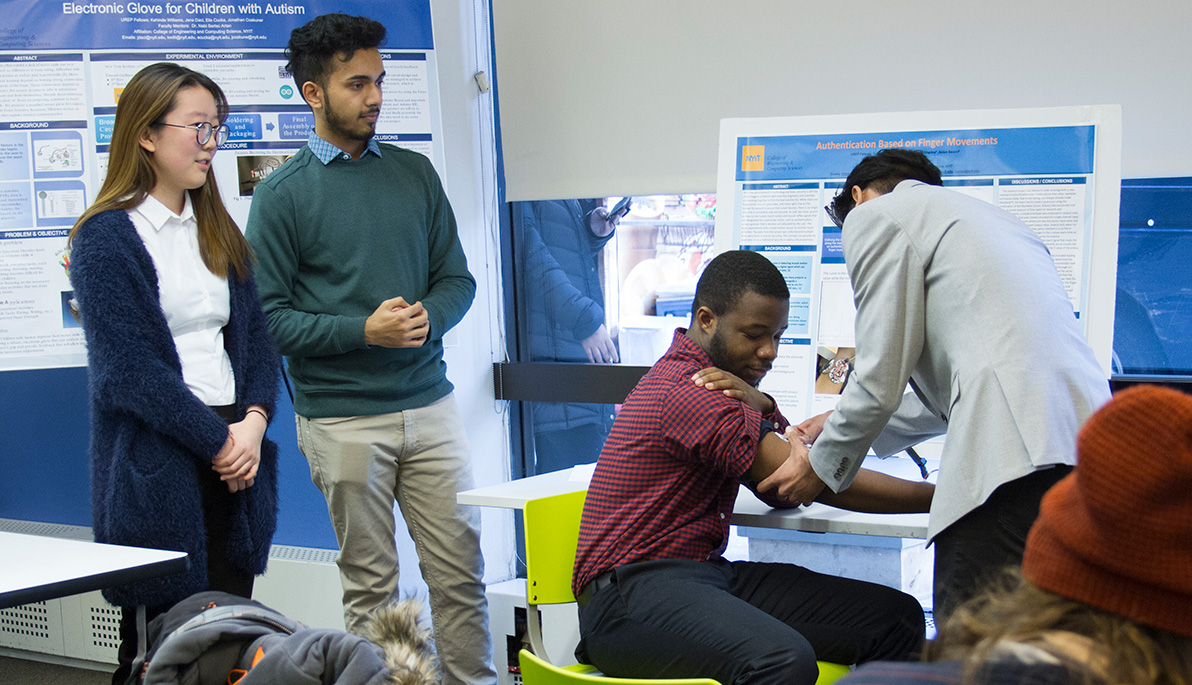News
Undergrads Do Research for Real
December 19, 2018
Pictured: Finger Gesture Authentication team members (left to right) Yuki Gao, Tejinder Mann, Kehinde Williams, and Piyush Sharma.
Has virtual reality ever made you literally queasy? Or have you wondered if there are new ways to detect cancer? Or questioned the air quality in your home? Undergraduate students in NYIT College of Engineering and Computing Sciences have, and thanks to the Undergraduate Research and Entrepreneurship Program (UREP), they were able to present their research on these questions and more to peers and faculty members in mid-December.
“The UREP grants are focused on research and exploration, giving students a chance to understand new concepts and applications,” says Ziqian (Cecilia) Dong, Ph.D., associate professor of electrical and computer engineering and UREP program director. Students do research throughout the semester on a wide variety of projects. “The nature of the program also leaves room for experimentation and failure in a highly supported environment,” she explains. “They are testing new hypotheses that may or may not work, but either way, the process teaches them how to frame a problem and then design an experiment to support or disprove the hypothesis.”
Projects can run for a single semester or extend to multiple semesters if the team decides to continue with further development. Once accepted into the program, each research team receives a faculty mentor and $500 to cover the cost of supplies. Participation in the program is extra-curricular, but that makes it no less coveted or competitive. “Regular coursework might not expose students to all the cutting-edge research that is out there,” says Dong. “UREP gives them a chance to address real-world problems—issues that their professional counterparts are already addressing in the industry.”
UREP participants Mohammad Talha and Zobayer Hossain, for example, addressed ways to provide wide access to clean water—one of the Grand Challenges for Engineering put forward by the National Academy of Engineers. The duo developed a spectrophotometer—an affordable device that can measure the absorption of light through different solutions—to help identify possible contaminants in water.
“There are solutions that address these problems that are already available, but only at specific laboratories and at a cost of up to $300,000,” says Talha. “We are trying to build a portable device that can help individuals get data right away at a cost of a few hundred dollars.”
After a semester of research and experimentation, the event on December 11 also provided students with an opportunity to hone their communications skills. Each group devised ways to explain their idea in a five-minute presentation. The format challenged students to speak concisely and passionately about their complex ideas.
For example, one team developed a sophisticated device with multiple electrical components, pressure sensors, and vibration motors. Student Kehinde Williams summed it up in one sentence: “Essentially, we’ve created a glove that helps autistic children grip things more efficiently.”
Williams believes the experience will be beneficial to his future in biomedical research, while his teammates, Jens Daci, Elis Cucka, and Jonathan Coskuner, each had their own reasons for getting involved. “I really wanted to work with [Assistant Professor] N. Sertac Artan, Ph.D., on a research project, and this felt like a way to do so and make a difference,” says Coskuner. “It’s been really exciting to work on this project, but it also feels really great to help people.”

Students and faculty members at the 2018 UREP presentation.
2018 UREP Projects and Teams
Spectrophotometer
Mohammad Talha, Zobayer Hossain
Faculty mentor: Ziqian (Cecilia) Dong, Ph.D.
VR Cyber Sickness
Mohammad Baidas, Stephan Brown, Ajlan Okman
Faculty mentor: Ziqian (Cecilia) Dong, Ph.D.
Machine Learning Approach to Large Scale Social Media Data Analysis
David Fernando, Gamboa Salazar, Hamad ElKahza
Faculty mentor: Houwei Cao, Ph.D.
Fluid Mech Team
Mogens Quansar, John Stadelmann
Faculty mentor: Milan Toma, Ph.D.
Team Air Filter T Shirt
Craig E. Sauter, Christopher De Leon, Sangwon Choi, Dong-Jin Lee
Faculty mentor: Ziqian (Cecilia) Dong, Ph.D.
Autism Glove
Kehinde Williams, Jens Daci, Jonathan Coskuner, Elis Cucka
Faculty mentor: N. Sertac Artan, Ph.D.
ID Scan
Mandeep Singh, Wilson Jang, Hyungjun Park
Faculty mentor: Helen Gu, Ph.D.
Finger Gesture Authentication
Tejinder Mann, Yuki Gao, Seton Swami, Piyush Sharma
Faculty mentor: N. Sertac Artan, Ph.D.
HLT Crew
Hashir Saifullah Syed, Tanvi Patel, Luke Harrison
Faculty mentor: Reza K. Amineh, Ph.D.
3D Microwave Imaging
Josiah-David Sykes, Desario Brown, Jose J. Casado, David Cohen
Faculty mentor: Reza K. Amineh, Ph.D.
Toxic Comment Detection
Stephan Brown, Oliver Trajkoski, Mohommad Baidas
Faculty mentor: Ziqian (Cecilia) Dong, Ph.D.
SyDrone
Rajendra Bhagroo, Christopher Guevarra
Faculty mentor: Xueqing Huang LI
Legacy Innovations, Inc.
Shubhang Jani, Mikhail Smirnov, Yousef Ahmed, Carlos Zuna
Faculty mentor: Felix Fischman

By Alix Sobler




